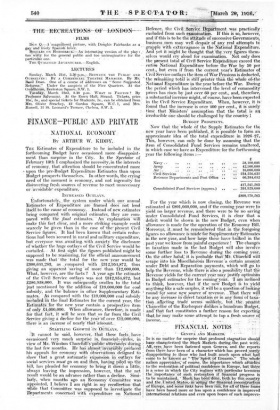FINANCE-PUBLIC AND PRIVATE
NATIONAL ECONOMY:
. - BY ARTHUR W. KIDDY..
THE EStimateS of Expenditure to be included in the forthcoming Budget have occasioned more disappoint- ment than surprise in the City. In_ the Spectator of February lath I emphasized the necessity, in the interests- . of economy, that attention should be concentrated more • upon the pre-Budget Eipenditure Estimates than-upon Budget prospects themselves. In other words, the crying-- need of the -moment is economy, and not ingenuity for discovering fresh_ sources of revenue to meet unnecessary . or .a voidable- expenditure.- • - • ---
INCREASED OUTLAYS.
Unfortunately, the system under which our annual Estimates of Expenditure are framed does not end- itselito the cause .of economy. __Instead of. new estimates being compared with original estimates, they are com- pared with the final estimates:— An —explanation' -will- make this fact _clear, and a more striking example could scarcely be given than in the case of -the Firesent Civil Service figures. 'It :Wad ljeen known- that certain reduc- tions had been-secured in naval and military:expenditure, but everyone was „awaiting_ with anxiety the disclosure of whether the huge outlays of the Civil Service would be curtailed. At sight the .figures published might be supposed to be:leas-Sin-nig, for the Official .announcement was Made- that' the ' total for the new -year would be £800,644,283, as .,compared, with ..1812,9544872, thus giving an apparent waving of more' that,. £12,000,000. What, however, are the facts ? A year ago the estimate of the Civil. Service outlays was not £812,954,872, but £286,958,000. It was. subsequently swollen to the total just mentioned by the addition of £19,000,000 for coal subsidy, and the balance in other Supplementary Esti- I mates. As Compared with the £19,000,000 coal subsidy included in the:final Estimates for the current year, the Estimates for the new year contain a proipeetive item of only _14,000,000. When allowance, therefore, is made for that fag, it will be seen that so far from: the Civil Service giving a decline for the year of-over 112,000,000, there is an increase of nearly" thatIn-Yount. _
STARTLING GROWT1i:iN :OL.Plat'S.
'It cannot be said, however, that _these facts,, have occasioned very much surprise in financial;ciieleS, in view of Mr. Winston Churchill's-piiblic- -; the last few months. He has almoA'invariatiltprefaCed his appeals for economy with' .Obser-vatioina designed. -Co - show that a great automatic expansion in. outlays for social services must go on and .then, having piled up-the bill, has pleaded for economy to 'bring it "down a little, always leaving the impression, however, that the net result would be an advance rather than a decline. Simi- when months ago an EconomY'-Cominittee was appointed, I, believe I am right- in my recollection- that j while that Committee was supposed, to -investigate the Departments concerned with expenditure on National Defence, the Civil Service Department was practically excluded from such examination. If this is so, hoWever, and if this is to be the attitude of successive Goverrinientsi business men may well despair of any real attempts to :grapple with extravagance in the National Expenditure, And yet. it niight.be thought that the very figures thena• selves would cry aloud for examination. Not only does the !resent total of Civil Service EXpenditure exceed the entire -National Expenditure before the War by 50 per cent.,. but even if from the current year's Estimates of Civil Service outdlaityusrtehe iteme year Warf0Preentshio:a Pensions isrd.ed the total is still-greater thin the whole of.the During the period which has intervened the level of -commodity prices has risen by just over 60 per cent., and, therefore, a substantial increase might, of course, have been expected in .the Civil Service Expenditure. When, however, it is found that the increase is over '400 Per cent., it is' surely time _that Ministers' assumption that the totar. is an irreducible one should be challenged by the countrY.I
BUDGET PROSPECTS.
Now that the whole of the Supply Estimates -for the new year have. been published,_ it is possible to farm an approximate idea of the total expenditure in 1926-27_ This, however, can only be done by :assuming that the item of Consolidated Fund Services remains unaltered, in which case we have as Expenditure for the forthcoming year the following items :—
Navy .. • • • • 58,100,000 42500,000 Army • • • • . • • Civil Sfirvides • - • • 234,256,631
16,000,00
ReVenue Departments'and Post Office . 66,384,652 417,241,283 • Consolidated •Fund Services (approx.) .. 391,929,000 £809,170,283
For the year which is now closing, the Revenue was estimated at £801,060,000, and if the coming year were to yield no larger revenue, and there were to be no saving under Consolidated Fund Services, it is clear that a deficit would be shown in the new Budget, even when allowance is made for the operation of the Econorny Moreover,- it-must be .remembered that. in the lforegoing figures no allowance is hide for Stippleirrentair-Estimates in the new.feari and'how la* these -have hulked in the past year we know from painful experienee ! The changes in taxation made in the _last Budget will also involve some fu—rther loss to Revenue during the coming year. On the other halid; it is;pro-batik thaflft. ChUrchill will scrape into his Miscellaneous Revenue 'a certain amount under PRA and Reparation payments, which will gO to help the 'Revenue, while there is also a possibility that the Revenue yieldS for the Current' year may justify optimis7in in Budget estimates' for the coining- year. I am inclined to .think, however, that if the new Budget is to yield anything-like a safe surplus, it will be a question of looking round-f5r .some new source of revenue. That there will be any-increase indirect taxation or in any -_form of taxa- tion. trade see*. unlikely, but:the. *salt Chancellor of the Exchequer dislikes a.humdrum Budget, andthat fact constitutes a further reason for expeetirig tliathe`inay make some attempt. to tap a fresh source of


























































 Previous page
Previous page